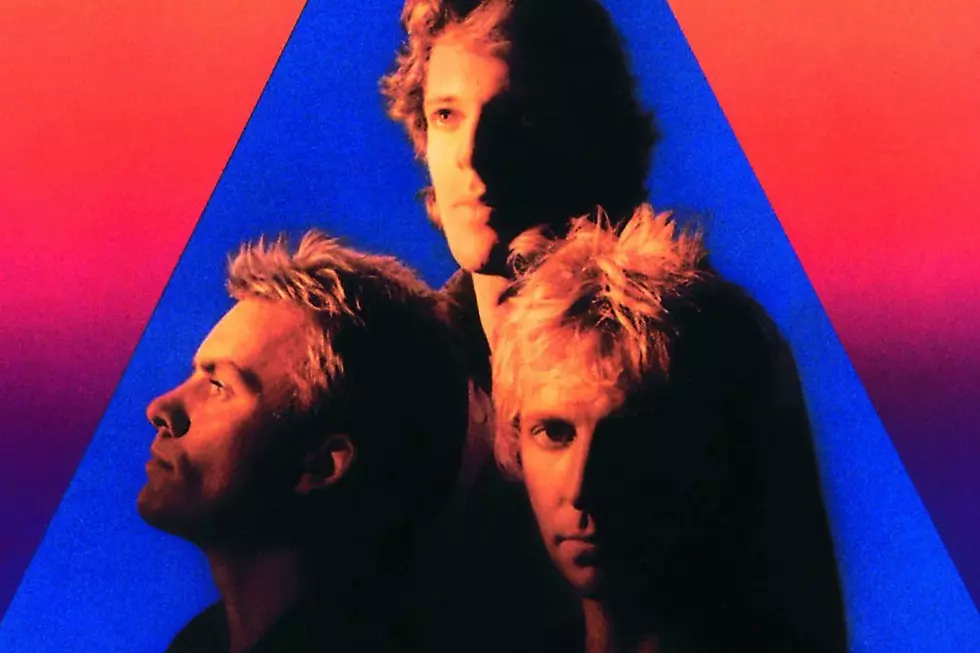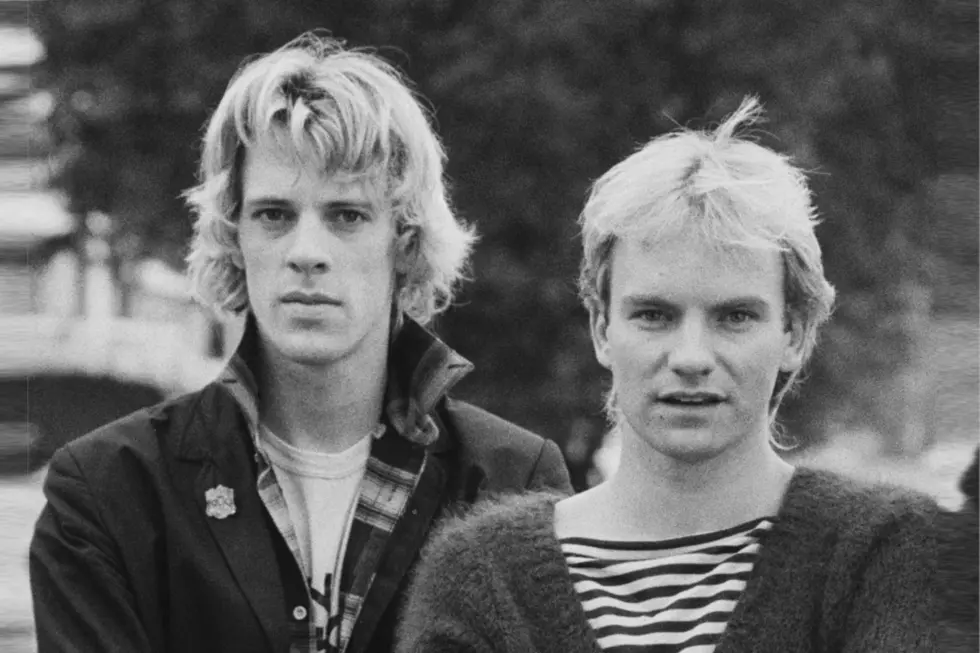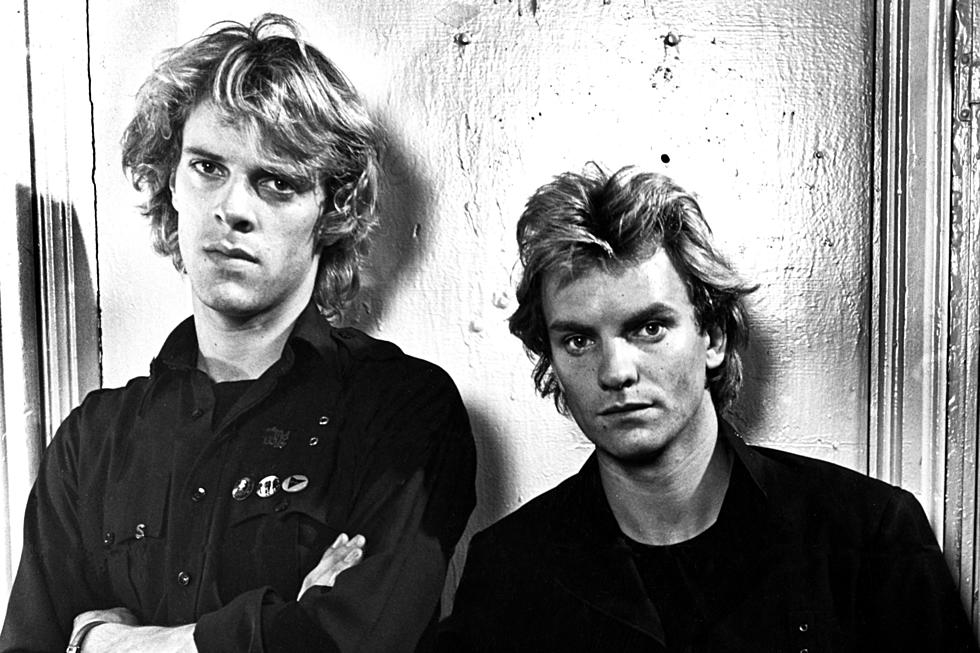
Why the Police Had to Fight to Make ‘Zenyatta Mondatta’
The Police found immediate success with their debut album, Outlandos d'Amour, in 1978, and scored an even bigger hit — in their native U.K., anyway — with Reggatta de Blanc the following year. By the time they entered the studio to record their third album in the summer of 1980, their unique blend of pop, punk, New Wave, and reggae had made them stars — and they definitely felt the pressure of delivering an even bigger, better follow-up.
"We're now at an agonizing time," frontman Sting told the Observer in early 1980. "We've had a great success with the first album. We've managed to beat the problem of 'the second album.' But now over the next few months we must do the third. We've mastered doing a kind of white reggae and it would be easy to continue in that vein. But we want to do something more than just explore the interface between reggae and rock. Blond reggae won't do, by itself."
It wasn't just figuring out ways of expanding their sound that dogged the members of the Police. Since signing with A&M for Outlandos in 1978, the band had resolutely insisted on handling their career on their own terms, wresting artistic control from the label and recording their first couple of albums on the cheap. For their first American tour, they famously schlepped their own gear from venue to venue in a Ford Econoline van. Staying so grounded helped keep them in the eye of the storm when things started to take off, but as guitarist Andy Summers later admitted, it also meant they had very little time to process their newfound fame — or even work on new material.
At the start of that first American tour, recalled Summers, "My wife was heavily pregnant when I left — seven-and-a-half to eight months. When I got home, it was like a dead rush. It was supposed to be a week off — the delivery date — and she had the baby two days later. The first year, the group was starting to snowball, and here we had this kid and we're trying to keep ourselves together. And all of a sudden, big success. It's very difficult. It was the hardest year of my life, I think. People who knew us intimately can't understand how we could get through it and keep our sanity."
The Police's ascension also dovetailed with an overall downturn in music sales. While Reggatta de Blanc proved enormously profitable for the label, margins were down throughout the industry, and as drummer Stewart Copeland pointed out, the band members were acutely aware of how many people were relying on them to deliver another hit with the next album.
"Occasionally I get vertigo," admitted Copeland. "So many people earn a crust from my activities, from something as delicate and transitory as my talent. While we were in the States last year A&M fired 180 people. People we knew as friends in some cases. The atmosphere in the place was like a morgue. So if I give them a tape now and, on reflection, tell them I think it's disappointing, I get 'What! We've got the year's budget planned, we're shipping gold, we've got the platinum albums ordered!' We can't have second thoughts now."
Further complicating things was the fact that the band's manager (and Copeland's brother), Miles Copeland, had booked a tour that only left them four weeks to record a follow-up to Reggatta de Blanc. Holed up with returning producer Nigel Gray at Wisseloord Studios in Hilversum, Netherlands, they found themselves short on time, at each other's throats, and feeling like each of their careers were at stake.
Listen to 'De Do Do Do, De Da Da Da'
All this stress manifested itself in various ways, up to and including arguments between the band members over how parts should be played and which songs deserved to make the cut. For Sting, who wrote the lion's share of the material, these fights often proved particularly personal — and even when he wasn't responsible for the composition in question, he could be an incredibly unforgiving rival. At these sessions, battle lines were deeply drawn over the Summers instrumental "Behind My Camel," which ended up making the album over Sting's extreme objections.
"As hard done by as I ever felt in this band, I could always take comfort in the fact that Andy got shafted even worse than I did on that little instrumental," Copeland admitted in 2000. "Sting didn't even bother to play on it. Andy played all the bass and guitars, and I only played on the song because there wasn't anyone else to play drums."
"I hated that song so much," laughed Sting, "one day when I was in the studio, I found the tape lying on the table. So I took it around the back of the studio and actually buried it in the garden."
Bitter as their disagreements could be, the trio were working toward a common goal, making the best possible album. And although they often saw things differently, they were still enough of a unit that they understood they were stronger together than apart. As Sting later pointed out, they were desperately trying to deliver a hit under what felt like a microscope.
"Obviously, when you make a record, you want it to be a hit. There's been that kind of pressure before. This became different," he explained. "The industry pressure — you could feel it during conversations with people in the industry. You'd hear about retailers waiting for your album to come out. So you'd be in the middle of making an album and you know about all these people waiting for it — including the record buyers, of course — and you started hoping that people were going to enjoy it. It's a terrible pressure to have."
The result, titled Zenyatta Mondatta and released on Oct. 2, 1980, was predictably a rather uneven set of songs. Fortunately for the band, the high points were more than enough to compensate for any flaws in the track listing — starting with the opening track and leadoff single, "Don't Stand So Close to Me," which went to No. 1 in the U.K. and No. 10 in the U.S., giving the band their third British chart-topper and first significant American hit since "Roxanne" brushed the Top 40 in the spring of 1979. The record's second single, "De Do Do Do, De Da Da Da," peaked at No. 5 in the U.K. and gave the band another Top 10 American hit.
Zenyatta Mondatta also found the Police making their first real inroads on the American album charts, where it peaked at No. 5, nearly matching its No. 1 U.K. peak, and went double-platinum while netting a pair of Grammy nods — one for "Don't Stand So Close to Me," which took home Best Rock Performance by a Duo or Group with Vocal, and one, presumably to Sting's chagrin, for "Behind My Camel," which won Best Rock Instrumental Performance. Once again, the band had managed to surpass its own lofty standards for success.
Of course, by notching another hit, the band put themselves in the unenviable position of being expected to do it all over again the following year. But even before they set about trying to best Zenyatta Mondatta, Sting seemed to suggest he was beginning to get a handle on the odd business of being a rock star — and learning to take joy from the moments in the spotlight that really had nothing to do with him at all.
"My favorite moments onstage are of silence, when the Police stop playing. There's just this great blank for the audience to fill in," he told the Sunday Times. "I often find myself looking out at them and wondering how I got here. I still don't think I really belong. Sometimes it's a depressing feeling, but often it's exhilarating."
See the Police Among Rock’s Most Underrated Albums
More From Ultimate Classic Rock









